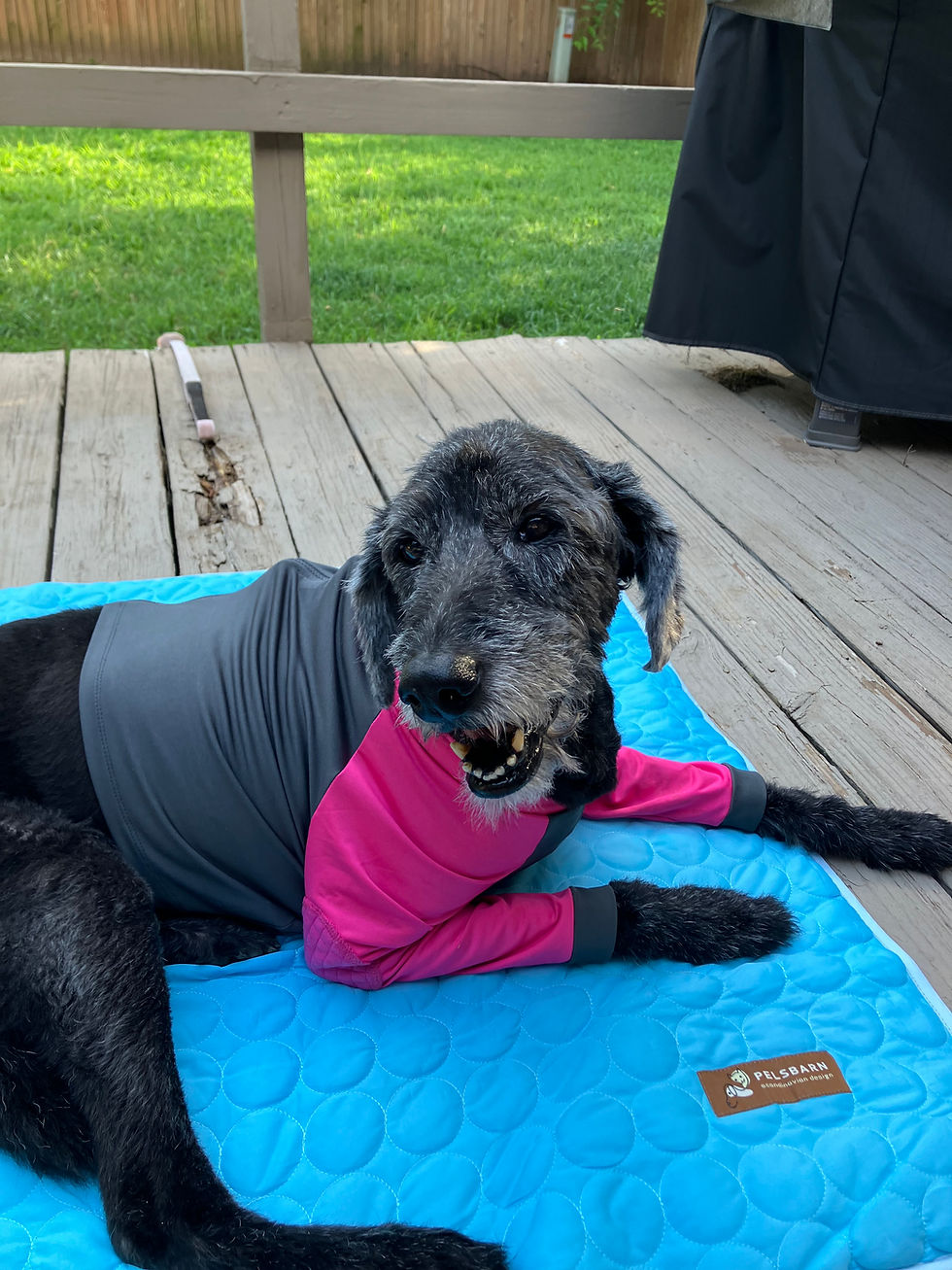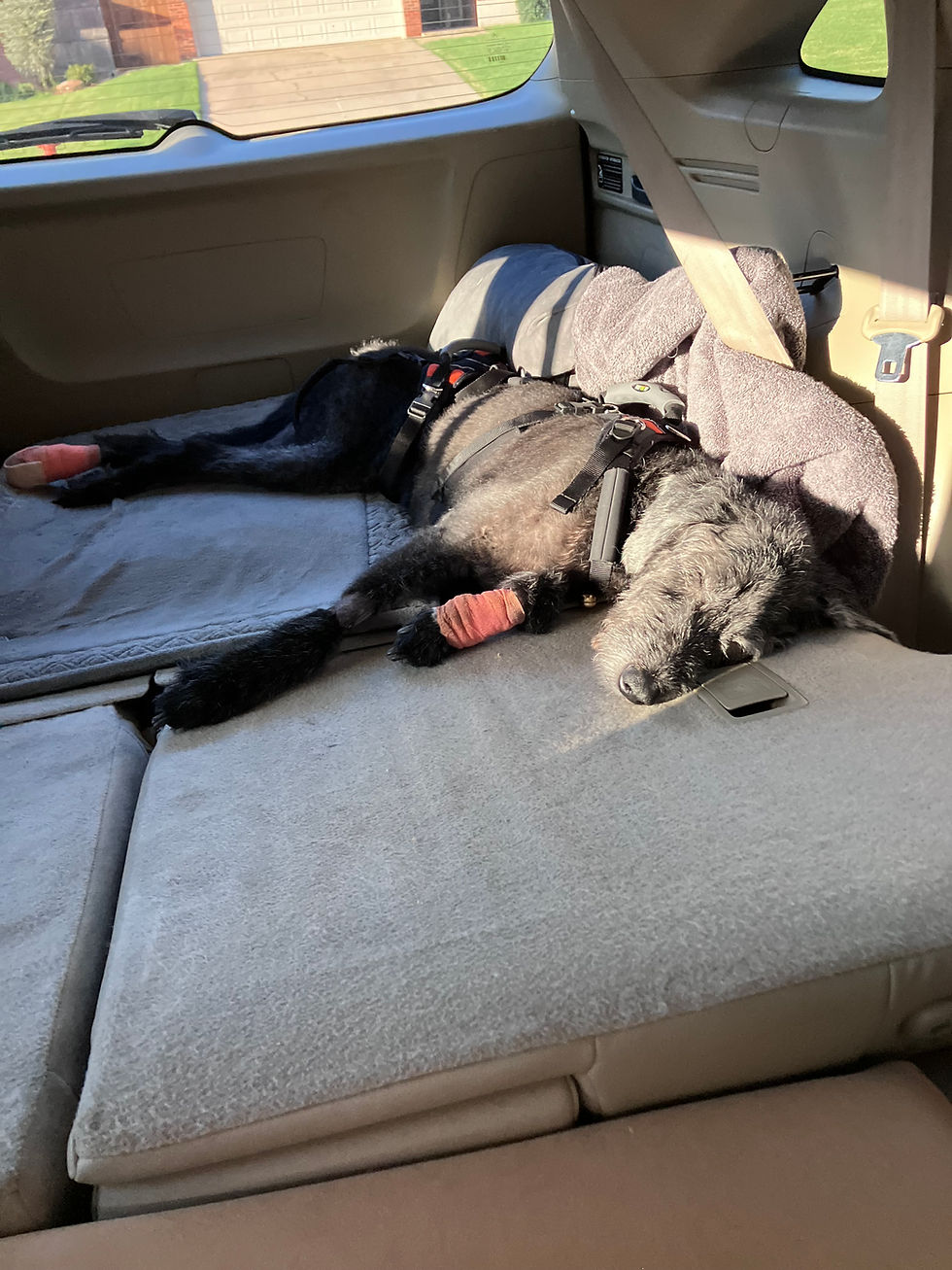Embracing the Journey of Senior Dog Care and the Heartfelt Goodbyes
- Josie Gimple
- Aug 27, 2025
- 5 min read

If no one told you, senior dog care is hard and not for the faint of heart. One day they are your young pup, and the next they have sugar coated muzzles, slower to get around, and sleeping more than they are awake. It feels like the change occurs overnight, but looking back, you see how it has been creeping along for years. I was lucky enough to have over 14.5 years with my soul dog.
Pet owners, such as myself, begin having anticipatory grief, which is a common occurrence. You begin getting emotional and sad thinking about they day when your beloved pet is no longer here, even though they are right there with you. Luckily there are support groups such as Pet Loss Community that can help you navigate those feelings. Other pet owners are also great sources of support because they know exactly how you feel.

Enjoy every movement you have left with them. Let them do the things that they enjoy (within reason). When your dog hasn't felt up to playing fetch in months, and suddenly wants to play, indulge them. However, be smart about reintroducing activities as they are not as spry and agile as they used to be. Short, soft throws that don't force them to make quick, cutting movements. Limit it to 5 throws at a time and make them rest.
Keep them physically and mentally stimulated. Take them on "sniffari's", which are short, meandering walkings, allowing them to sniff around and provide new or unusual scents. This is like their form or "social media". Short, more frequent walks may be more beneficial, or consider things such as a wagon to tote them around. They like and need the fresh air, and the change in environment can help manage depression and provide sensory stimulation. Consider slow feeders or treat puzzles as well to help keep their mind sharp. Of course, consider canine rehabilitation/physical therapy to help improve strength, mobility, and manage pain to help them continue living their best lives.

Bailey loved her poop snacks. In the end, there was no point arguing with her. She got her way no matter what, and she knew it. She no longer wanted to go in the backyard, but demanded to sniff around the front yard and find all the cat poop. You can see the joy she found in doing so and felt no shame or guilt. This was the mental and physical stimulation that she loved and needed to keep her happy and active.
Consider home modifications, foot care, and equipment to help them get around better. Often times, the pets have a harder time getting around, it is important to make their environment as friendly and accessible as possible. This may include using Yoga mats or runners on the floor to provide traction. Boots, toe grips, or stickers can be used to help provide some traction for footing as well. Making sure their nails or short and toe hair trimmed also are ways to provide more support. Other equipment may be help 'em up harnesses, knee/elbow sleeves, or wheelchairs to help provide support and stability. Also consider orthopedic beds such as Big Barker to provide extra support for achy joints.

Regular check-ins with a veterinarian, senior screenings, and routine visits aid in identifying problems and managing symptoms and diseases. We were frequent fliers at the vet clinic, but my vet knew Bailey very well. We had open discussions about treatment options, medications, surgical interventions, etc. We also discussed how to determine when it was time to say good-bye. I frequently told my vet that I could not be objective about Bailey and that she would have to tell me when it was time. The relationship and trust I have with my vet was instrumental in helping Bailey to live a long, happy life as well as helping me know when to say our final good-bye. Bailey would not have lived over 14.5 years without the caring veterinarian support team.
Be aware of your physical and mental limits when caring for your pet. This can be a difficult realization. As your dog grows older, or if illness or injury occurs, your pet's physical and mental needs may change. They might require more physical help, along with the emotional and mental strain that caregiving involves. This can include accidents in the house, falls, unsteady walking, physical assistance for all activities, or special food for them as well as cognitive changes such as trouble sleeping at night, getting lost, confusion, barking, or being extra needy. Caregiver burnout is a genuine concern. It's crucial to recognize what you can physically and mentally manage for your pet. You don't want to develop resentment towards your pet, but you also want them to feel your deep love. However, if you injure yourself while caring for them, you won't be able to give them the proper care they need.

How do you know when it's time to say your final good-bye? Companies such as Senior Dog Co as well as talks with your veterinarian can help you know when the time has come. Is your pet happy? Are they hungry? Are they drinking? Do they act like they want to be there? Has their personality changed? Am I physically and mentally able to provide the care they need? Sometimes our dogs just know when it's time to say good-bye and help make the decision for us. Bailey started having seizures a month prior, but was managing well with medications, once we go over the balance issues associated with the seizure medication. She was happy and hungry until the day she crossed the rainbow bridge. That day was different. The vet had told me that if Bailey started having cluster seizures that could not be controlled by medication, that would be the sign. Sure enough, that is what happened. She was not hungry and no longer smiled. The light in her eyes was gone. She fought until the bitter end. She was truly the toughest dog I've ever know.

Coping after the loss of your beloved pet can be a long and tedious journey, but you are not alone. R.M. Drake in his book "Dog People" wrote, "It's hard getting over a dog. Not because you can't accept they're gone, but because everything in you still remembers how it felt when they were here. You remember the way their head would tilt when you spoke, as if your voice was the only sound that mattered. The way they seemed to understand you on days when no one else could. The way they made the world feel softer, safer, somehow lighter--just by existing beside you. The hardest part isn't the goodbye. It's all the days after. It's realizing there's no one waiting by the door. No one watching you with those eyes that saw the best in you, even on your worst days. It's how the world keeps moving forward, but part of you stays back with them, in the moments you'd give anything to live again. You don't "move on" from a dog. You just learn how to walk through life carrying the echo of their love. And on the loneliest nights, you still hope that somehow, somewhere, they know you never stopped missing them."
Don't feel guilty about your decision. It is easy to think that you made the wrong decision or wonder if you made your pet suffer. Know that you are an awesome and amazing pet parent. You did the best you could with the resources (time, money, energy) that you could and you loved your pet with every fiber of your being. You gave them the best life possible. They love you and saw the best in you.







Comments